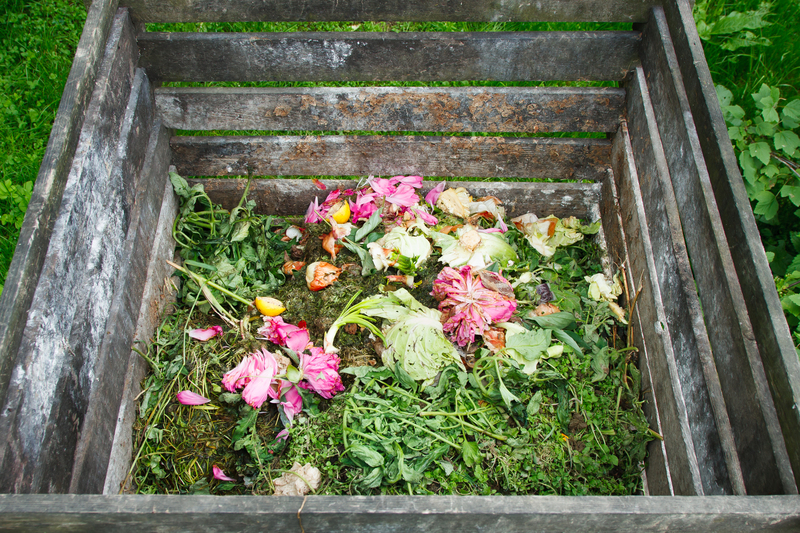Finding Local Recycling Centers for Pots and Pans
Decluttering your kitchen often leads to a collection of old pots and pans--some scratched, warped, or simply replaced by better models. Instead of letting these items take up precious cupboard space or tossing them in the regular garbage bin, it's important--and environmentally responsible--to recycle them properly. But how and where can you recycle old cookware? This comprehensive guide will help you find local recycling centers for pots and pans, while explaining why and how to do it effectively.

Why Should You Recycle Old Pots and Pans?
Every year, millions of tons of metal waste--including kitchen cookware--end up in landfills, taking decades to decompose. Most pots and pans are made from metals such as aluminum, stainless steel, or cast iron, all of which are highly recyclable. Recycling not only reduces environmental impact but also conserves raw materials and energy. The next time you replace your saucepan, take a moment to consider the benefits of responsible disposal.
- Reduces Landfill Waste: Metal does not decompose easily, creating long-lasting waste issues.
- Conserves Natural Resources: Recycling metal saves mining new ore and the environmental costs associated with it.
- Energy Efficient: Recycled aluminum, for example, uses up to 95% less energy than producing new aluminum.
- Supports Local Economy: Recycling centers provide jobs and secondary materials for manufacturers.
What Types of Pots and Pans Can You Recycle?
Not all cookware is recyclable through curbside programs, but many local metal recycling centers accept a wide variety of kitchen items, including:
- Stainless Steel Pots and Pans
- Cast Iron Skillets
- Aluminum Cookware
- Copper Pots and Pans
- Nonstick Cookware (in some cases)
*Note: Although non-stick coatings have improved in environmental safety, some recycling centers may not accept Teflon-coated cookware due to the chemical content in the coating. Always check with your recycling center for their specific policies.
Where to Recycle Pots and Pans Locally
1. Local Scrap Metal Yards
Scrap metal yards are one of the best places to recycle pots and pans. As they accept a wide range of metals, you may even get paid a small amount for your old cookware, especially for cast iron or copper pots. Before dropping yours off, make sure all non-metal attachments (handles, glass lids, plastic knobs) are removed.
- Pro tip: Use a magnet--if it sticks, your cookware is steel or iron; if not, it's likely aluminum or copper.
2. Municipal Recycling Centers
Many cities operate recycling drop-off facilities that accept metal kitchenware. Contact your city's waste management department or visit their website for information on accepted materials and drop-off procedures. Some centers require residents to separate metals from other recyclables.
3. Curbside Recycling Programs
While pots and pans are usually not accepted in standard curbside recycling bins, exceptions exist in certain areas with advanced programs. Check your local guidelines--some communities collect small scrap metal items at the curb, particularly during bulky item pickup days.
4. Household Hazardous Waste Events
Some communities host periodic collection events for hard-to-recycle items--including cookware. These are often advertised by your city or county's environmental services department. While primarily for hazardous items, many accept old kitchen pots and pans as metals.
5. Specialty Retailers and Manufacturers
Certain cookware brands and retailers offer take-back programs for old pots and pans--especially during trade-in promotions. If you're upgrading to new cookware, ask your retailer if they'll dispose of your old kitchenware responsibly, or if they have a recycling initiative.
How to Prepare Pots and Pans for Recycling
Properly preparing your cookware increases the chances they'll be accepted--and successfully recycled:
- Remove all non-metal parts: This includes handles, glass lids, rubber or silicone grips, and screws. Scrap yards and recycling centers usually require clean metal.
- Give them a quick clean: Thick grease, stuck-on food, or rust can sometimes interfere with the recycling process. A quick wash suffices.
- Sort by material: If you have multiple types, separate aluminum, stainless steel, cast iron, and copper items before heading to the center. This simplifies sorting for staff at the recycling facility.
- Check for hazardous coatings: Some older pans have Teflon or PTFE coatings. Ask your local processor if they accept pans with such coatings--if not, these may require disposal through special programs.
What If My Pots and Pans Aren't Recyclable Locally?
If your local recycling center cannot accept your pots and pans--especially those with non-removable plastic parts or chemical coatings--consider these environmentally friendly alternatives:
- Donate to Local Charities or Thrift Stores: If your cookware is still functional, many shelters or second-hand stores welcome donations.
- Give Away to Neighbors: Use online resources like Freecycle, Facebook Marketplace, Craigslist, or your neighborhood app to find someone who can give your old pots a second life.
- Upcycle or Repurpose: Old cast iron pans or unique pots make great planters, art projects, or decorative wall pieces.
- Sell as Scrap: Even if you're not near a major metal recycling center, local junkyards may accept old metal pots and pans for scrap value.
Useful Online Tools to Find Local Pots and Pans Recycling Centers
Several reliable online resources can help you locate recycling facilities near you:
- Earth911 Recycling Locator: Visit Earth911.com and enter "pots and pans" plus your zip code for an up-to-date list of nearby acceptance points.
- Recycling Partnership (recyclecheck.org): Use their database to confirm what your local curbside recycling program accepts.
- Call2Recycle: Though mainly for batteries, they're expanding into more household items, including metals--check regionally.
- Local Government Websites: City and county environmental services often provide directories or PDF guides on specialty recycling locations.
- Yellow Pages or Google Maps: Search for "scrap metal recycling near me," "metal recycling center," or "kitchenware recycling."
Tips for Using Online Recycling Locators
- Enter specific terms like "cookware," "aluminum pans," or "cast iron skillet."
- Check facility descriptions for any notes on accepted materials.
- Call ahead to confirm hours and policies, as websites may not always reflect real-time changes.
What Happens to Recycled Pots and Pans?
After you drop off your old cookware, what's next? The recycling journey for pots and pans is fascinating and demonstrates the value of your choice to recycle:
- Sorting: Cookware is first sorted by metal type using magnets and specialized machines.
- Shredding/Cutting: Larger items are broken into smaller pieces for easier handling.
- Melting: The metals are melted down in industrial furnaces, separated by type.
- Purification: Impurities and coatings are removed so the recycled metal meets industry standards.
- Reuse: The clean metal is formed into new products--sometimes even new pots and pans!
By choosing to recycle, your old frying pan could end up as a new bicycle frame, a car part, or a fresh set of cookware, truly giving your kitchenware a new cooking adventure!
Frequently Asked Questions About Pots and Pans Recycling
Can I recycle nonstick pans?
*Some recycling centers accept nonstick pans if the Teflon or PTFE coating is undamaged and can be removed. Others may not accept them due to the chemical content. Always check with your local facility.
Tip: Some brands offer their own recycling programs for nonstick pans, regardless of the coating's condition.*
What about glass lids?
Glass lids are rarely accepted at scrap metal yards but might be taken by local glass recycling programs. Ensure the lid is clean and free of metal rims or handles before dropping off.
Can I put old pots and pans in my curbside bin?
Usually, no. Most curbside programs are not equipped to process larger metal items, which can jam sorting equipment. Call your waste management provider to double-check and avoid possible fines.
Are handles, screws, and knobs recyclable?
Handles and other attachments made of plastic, rubber, or wood are not accepted at metal recycling centers and should be removed. If handles are metal, they may be recycled with the rest of the pot or pan.
Is recycling cookware free?
Most municipal centers accept metal recycling for free, while some scrap yards may pay for valuable metals. Be aware of any drop-off fees for large amounts of metal or specialty items.
Best Practices for Environmentally Responsible Cookware Disposal
- Always call or check online before dropping off items to ensure they are accepted at your chosen location.
- Prepare your pots and pans as instructed above for the best recycling experience and acceptance.
- Spread the word about cookware recycling in your community--many people are unaware that even their old pans can be recycled!
- Consider the lifespan of new purchases: Look for durable, recyclable, and non-toxic cookware materials to make future recycling even easier.

In Summary: Finding the Right Recycling Center for Your Pots and Pans
Whether you're decluttering your kitchen or upgrading to new cookware, responsibly recycling old pots and pans is just as important as recycling newspapers or bottles. With a range of options--from local scrap yards to municipal recycling centers, specialty stores, and donation sites--there is a responsible way to dispose of every old skillet, baking pan, or saucepan.
Start with a quick search using online resources to find local recycling options for your pots and pans. Prepare items as recommended and take pride in giving your old kitchenware a new purpose--helping your community and the environment at the same time. Small efforts add up to big changes in the world of waste management and recycling!
Resources and Further Reading
Taking the initiative to recycle your old pots and pans is a simple way to make a lasting positive impact on the planet. The next time you update your kitchen, let sustainability guide your cookware disposal decisions!